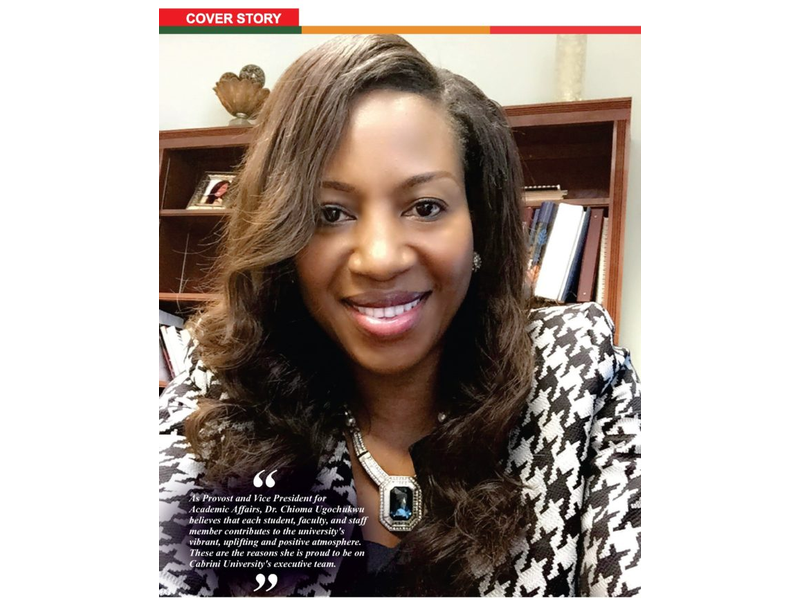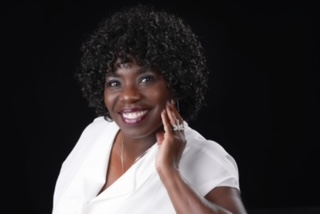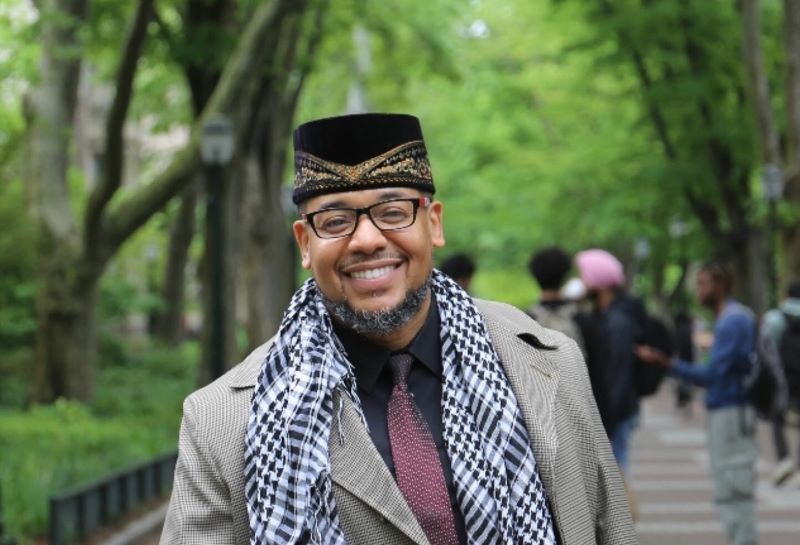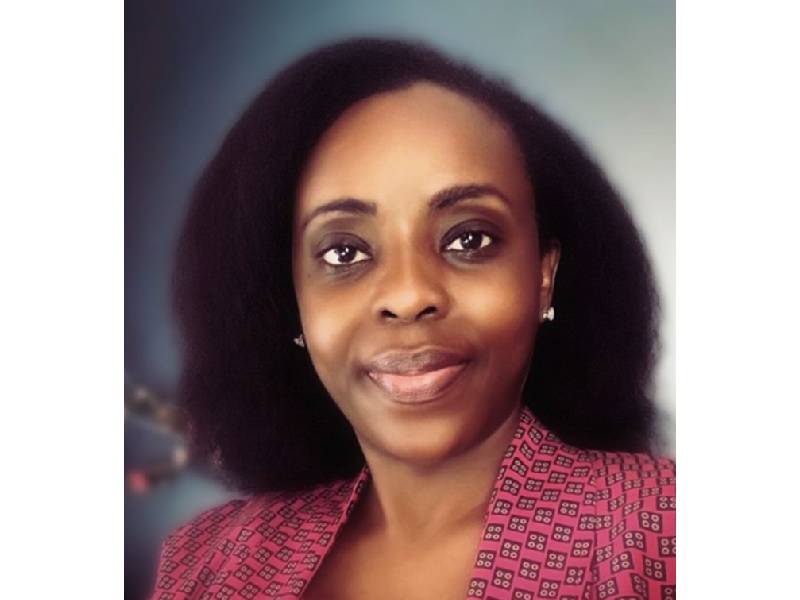Dr.Ugochukwu has also been featured on the Cabrini University website. As a Provost and Vice President for Academic Affairs, Dr. Chioma Ugochukwu believes that each student, faculty, and staff member contributes to a university’s vibrant, uplifting and positive atmosphere. These are the reasons she is proud to be on Cabrini University’s executive team. Dr. Chioma Ugochukwu received her Ph.D. in Journalism and a doctoral portfolio in Women’s Studies from the University of Texas at Austin. Prior to assuming the role of Provost at Cabrini University, she served as the Vice-President for Academic Affairs and Dean of Faculty at Cottey College. She also served as Dean of the School of Social Sciences, Business and Education at Mount Mary University, and the Assistant Dean in the J. William and Mary Diederich College of Communication at Marquette University. She was a tenured associate professor of Journalism at the University of South Carolina Upstate, where she also had the role of Coordinator of the Journalism unit and Adviser to the student newspaper.
In her different roles as a Cabinet member and Chief Academic Officer, she has exercised oversight for all aspects of academic programming, including planning and implementation, fiscal management, assessment and accreditation, faculty recruitment and development, student retention and persistence, and academic support services. She successfully created new programs and diversified delivery methods. She was also instrumental to increasing enrollment yields by as much as 15% and minority enrollment by 10% at one of the colleges where she served.
Prior to her academic work, Dr. Chioma Ugochukwu was a professional journalist and served as a political reporter, columnist, and features editor. Her columns addressed politics and issues impacting women. She has written academic papers on women’s affairs and published a contribution in the book, Women, Men and News: Divided and Disconnected in the Media Landscape, edited by Paula Poindexter, Sharon Meraz and Amy Schmitz Weiss. In her free time, she volunteers for charitable organizations, including Mobile Meals and serves on community-based organizations. She is an honorary member of Delta Epsilon Sigma national honor society because of her commitment to Cabrini’s mission and acceptance of the responsibility of service to others. She is a member of the Philadelphia Association of Black Journalists, where she also serves as a member of the Public Relations Council. She has been a member of the parent organization, the National Association of Black Journalists, for more than a decade. Dr. Ugochukwu serves as a diversity trainer and youth mentor and often travels as a keynote speaker for events aimed at motivating the youth and steering them toward higher education. She is passionate about migrants’ rights and often speaks on that issue because of its impact on Africans in the diaspora. Dr. Ugochukwu served as the keynote speaker for FunTimes magazine’s Women of Influence Award in 2019. At that event, she was honored with a citation from the Council of the City of Philadelphia. She was also a member of Delta Kappa Gamma, a professional honorary Society for women educators. Dr. Ugochukwu has two daughters and lives in Malvern, PA.
What is a defining moment in your career and life?
What I consider as my defining moment is probably different from the kind of event that others would identify as their defining moment. Mine wasn’t a specific event, but rather watching how another African-American female colleague at one of my previous institutions navigated academia.
When I was hired as a faculty member, fresh out of graduate school, I noticed another African-American woman who had been in her position as an assistant professor for about four or five years. She was not tenured at the time, because tenure is sought at the sixth-year mark. Most leadership positions are also reserved for tenured faculty members. This young lady decided to run for the position of department chair, even though she was not yet tenured. She was running against a well-respected, established, and tenured White colleague who had name recognition and had been a full professor at the university for a number of years. Some of our colleagues were skeptical of the woman’s candidacy, with some even saying that she was “living in la la land” to even think she would get the position. I personally thought that it took a lot of courage for her to even consider putting herself out there. Well, this colleague did not pay attention to the chatter amongst those who doubted her. It was obvious that she believed in herself and knew that she had the leadership mettle. She knew that even though she was younger and less experienced, she had the vision, passion, and grit needed for the job. She actually ran a great race, made a compelling case for why she should be the chair of the department even though she was an untenured faculty member, and contrary to expectations, she got an overwhelming number of votes and became the chair of our department. Some years later, she took on a Dean’s role at another institution.
Observing this colleague’s tenacity, confidence, and hard work at this early stage of my career in academia had a huge impact on me and became my defining moment. This colleague served as a source of inspiration and a reminder that setting the highest goals for myself with the expectation of realizing them should not be an impossible task simply because I was a Black woman. Watching her showed me that putting in the hard work, being confident in one’s ability, and not letting naysayers shake one’s confidence goes a long way. She taught me that we are the only ones who can stand in our way. That experience also taught me that representation matters.
Seeing another young African-American woman secure a leadership role in the department made me believe that I too could one day become a leader, and that having such a dream for myself wasn’t a wrong path for a young woman of color to pursue. It made me also keenly aware that other women may be looking up to me as a role model even when I don’t see it, so I have to act accordingly.
What challenges have you faced as a woman of color in your field and how did you overcome them?
I have worked hard my whole life and I have been blessed too. A part of me believes that I have led a guided life. Guided, in the sense that I think that God has been with me and ordering my steps. It is my faith that has sustained me and given me the confidence to overcome the challenges and micro-aggressions that come with being a woman of color in leadership roles. I have been in several situations where I have been the lone person of color or the only woman of color on the team. As a Black woman and an African-born woman, you come across people who either stereotype you, are dismissive of your talents, expertise, and accomplishments or who are just outright condescending. There is not a lot you can do to change how other people act or to make them acknowledge their own biases- implicit or otherwise. My answer has always been to let my results do the talking.
What woman inspires you and why?
I will say Michelle Obama, particularly for her authenticity. She shows us how to act with grace and courage. She seems quite adept at navigating the tricky role of being a first lady who happens to be a woman of color. She addresses hot topics in a heartfelt and convincing manner, and in a way that does not alienate people, even those who may disagree with her. She also seems to have figured out how to create the right balance in her various roles as wife, mother, and public figure.
What is your advice to the younger generation of women coming after you?
My greatest desire is to see our young women do well. One of the reasons I decided to add a doctoral portfolio in Women’s Studies to my academic portfolio when I was pursuing my PhD was so that I could have a research-based grounding on issues that impact women. I have worked at a couple of Women’s colleges in the past, because I believe in the mission of empowering young women to lead and helping to remove barriers they face in the domestic and professional arenas.
One of the things I say to young women is that it is okay to have big dreams. In fact, I agree with those who argue that if your dreams don’t scare you, then they are perhaps too small. I want young women to embrace any ambition they may have. They should believe in their own self-efficacy and ability to realize those dreams. One of my favorite quotes is by Wolfgang von Goethe who says that “Whatever you think you can do or believe you can do, begin it. Boldness has genius, power, and magic in it.” If there’s an opportunity out there, go for it. I always say that the worst that could happen is that you will get a “No,” but what if you hear a “Yes”? You will never know until you go for it. Too often women try to take up less space. We are often more comfortable in hiding our talents and voices, and we allow people to make our dreams seem too unrealistic and our desires seem unladylike.
Many young women allow other people’s definition of what a good wife and a good mother looks like prevent them from pursuing their dreams. I want these women to understand that setting goals for themselves is not incompatible with being a good mother or wife. The important thing must always be self actualization and living a fulfilled life, which is only possible when you are the one driving the decision about your life. You can be just as fulfilled as a housewife as being the CEO of a Fortune 500 company as long as you are the driver of that choice and you are not simply living a life determined by another person’s expectations. Young women also need to understand that every job is an audition for the next one. There is always someone observing and taking note of your dedication and work ethic or lack thereof.
Finally, I think that integrity goes a long way. Treat people well and keep your word. You will be surprised at how far you will go when you build goodwill and proceed with integrity.
What does being a part of the African Diaspora mean to you?
I love being an African and a part of the African diaspora. I have moved a few times and one of the first things I do each time I relocate is to look for local organizations for Africans, Nigerians, or African women. I love that we have so much culture. I love our food, our fabrics, our fashion, and our music. Being part of the diaspora propels me to push even harder, because I recognize that we always have to prove ourselves. Not many people in our circles, for instance, know someone else who is of African heritage, so there’s always that burden or pleasure to be the right representative for our people and the diaspora. I often giggle when I see this TV commercial where a girl is trying to motivate her dad and is repeating to him, “You did not wake up this morning to be mediocre.” That has actually been my mantra. I did not come to the United States to be mediocre.





